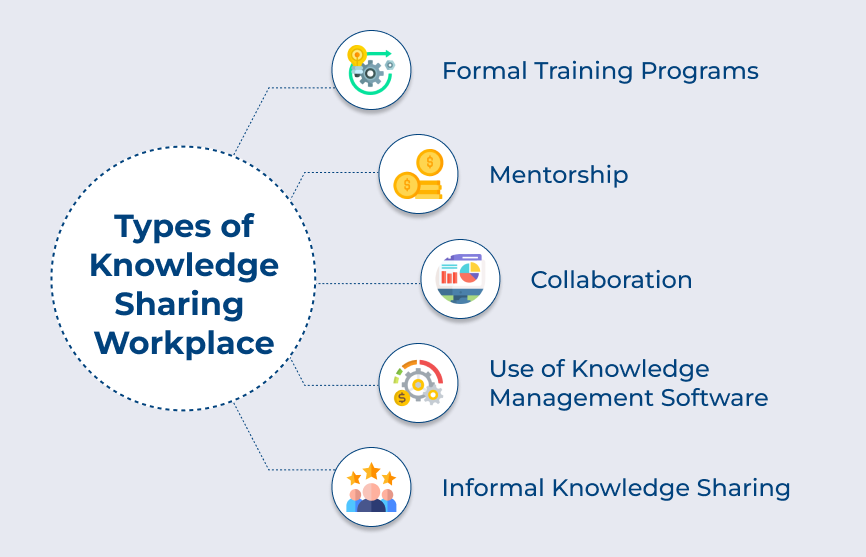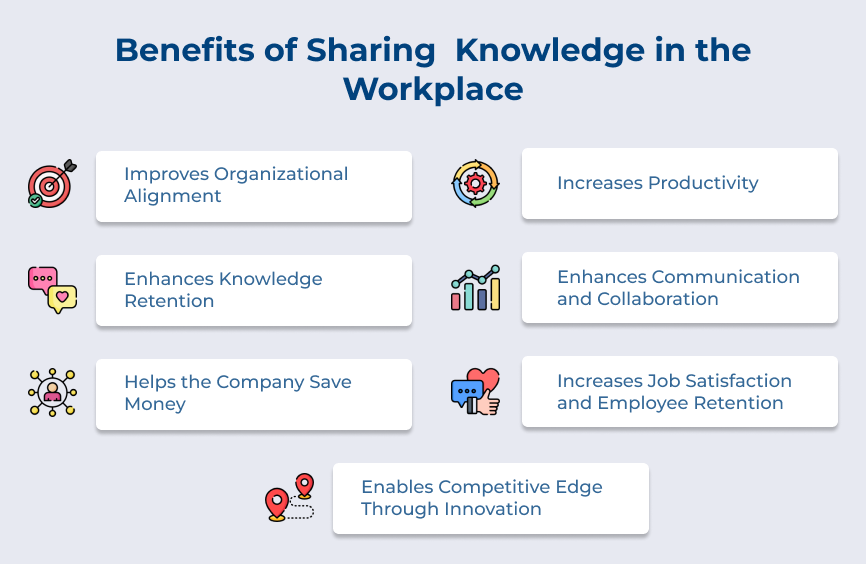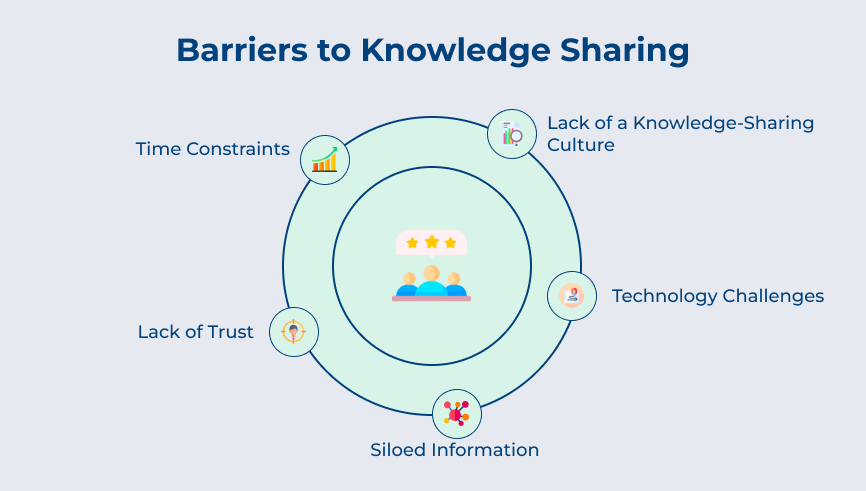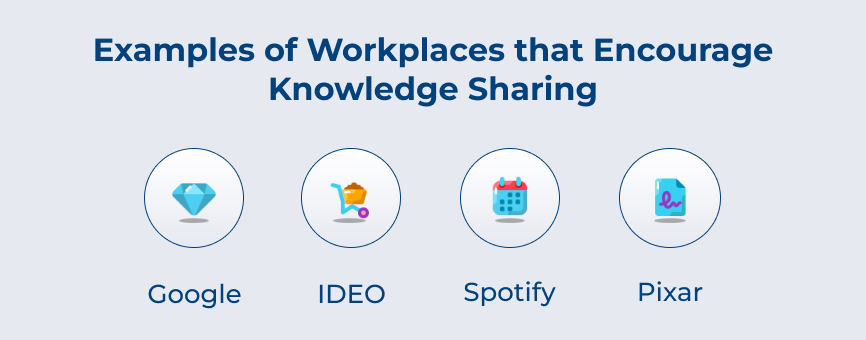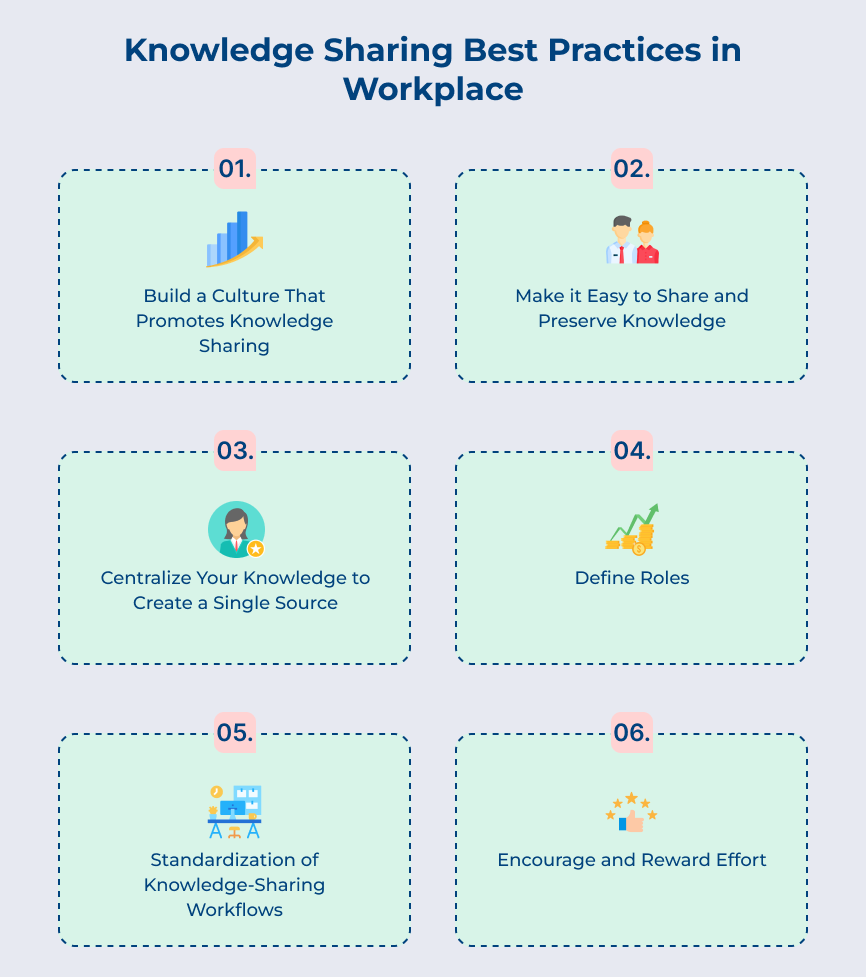1. Improves Organizational Alignment
Encouraging knowledge sharing in the workplace can lead to a multitude of benefits. One of the most significant is improved organizational alignment. Team members freely sharing their knowledge creates a more cohesive environment. Improved organizational alignment means that all team members are on the same page when it comes to goals, objectives and strategies.
Let’s assume a team member shares their expertise on a particular project or task. It can help align other members’ understanding and approach to that project. It ensures that everyone is working towards the same goal with a shared understanding of how to achieve it.
Pro tips:
- Encourage open communication and collaboration among team members.
- Implement systems and tools that make sharing knowledge easy.
2. Increases Productivity
When employees share their knowledge and ideas, they can work more efficiently toward common goals. It helps to prevent silos and promote collaboration among team members. Employees can learn from each other’s expertise by promoting a culture of knowledge sharing. It leads to continuous learning and improvement within the organization.
The practice can result in innovative solutions, streamlined processes and higher-quality work output. Encouraging employees to share their insights about using a new software program can help the team quickly become proficient in its use. It reduces the learning curve and increases productivity.
Pro tips:
- Provide incentives or recognition for employees who actively share their knowledge.
- Create platforms or channels for easy communication and sharing of information.
3. Enhances Knowledge Retention
When information is shared freely within a team or organization, individuals are more likely to retain that knowledge for longer periods. Employees can learn from one another, build on each other’s ideas and expand their knowledge. It helps in creating a culture of open communication and collaboration.
The practice promotes a sense of teamwork and ensures that important information is not lost when employees leave the organization. Let’s consider a team where each member shares their unique skills and experiences. Everyone on the team becomes more well-rounded in various areas, leading to a stronger unit.
Pro tips:
- Create a digital platform for employees to share resources, articles and information.
- Recognize and reward employees who actively participate in knowledge sharing activities.
4. Enhances Communication and Collaboration
One of the key benefits of encouraging knowledge sharing is the ability to enhance communication within the team. When employees share their knowledge, they can better understand each other’s perspectives and work more cohesively. 85% of employees agree that preserving and sharing unique knowledge in the workplace is critical to increasing team productivity.
Collaboration is also enhanced through sharing, as team members can pool their expertise to achieve objectives efficiently. Employees can come up with solutions by leveraging each other’s knowledge which may not have been possible if working in silos.
Pro tips:
- Create a culture of openness where employees feel comfortable sharing their knowledge and ideas.
- Use technology tools, such as collaboration platforms or knowledge management systems, to facilitate sharing and access to information.
5. Helps the Company Save Money
Encouraging knowledge sharing in the workplace can lead to significant cost savings for your company. Businesses can avoid redundant work, improve efficiency and reduce expenses by enhancing a culture of open communication.
The practice saves time and reduces unnecessary costs related to redoing tasks. Let’s take an example of a marketing team regularly sharing successful campaign strategies. It can avoid spending resources on ineffective marketing tactics. The collaborative approach can lead to higher ROI and lower marketing costs for the company.
Pro tips:
- Provide training and resources to help employees effectively share their knowledge with their colleagues.
- Encourage cross-functional collaboration to ensure that information is shared across departments and teams. It leads to a more holistic approach to problem-solving and decision-making.
6. Increases Job Satisfaction and Employee Retention
Encouraging knowledge sharing in the workplace can lead to increase in job satisfaction and employee retention. When employees feel supported in sharing their knowledge with their colleagues, they are more likely to feel engaged in their work. The sense of collaboration and teamwork can promote a positive work environment that boosts job satisfaction.
One example of the benefit in action is when a company implements a knowledge-sharing platform where employees can easily share ideas. It not only helps to break down silos but also creates a sense of belonging among team members.
Pro tips:
- Create a culture of transparency where employees feel comfortable sharing their knowledge and ideas.
- Implement regular training sessions or workshops to help employees develop their skills and expand their knowledge base, further increasing job satisfaction.
7. Enables Competitive Edge Through Innovation
Organizations can tap into the collective wisdom of their workforce, by encouraging knowledge sharing, allowing for the cross-pollination of ideas. It can result in the development of unique offerings that set the company apart from its competitors.
Let’s consider that a technology company encourages sharing knowledge among its engineers and developers. They may discover new ways to streamline processes or create cutting-edge products that revolutionize the industry. The constant flow of ideas can keep the company at the forefront of innovation and ahead of the competition.
Pro tips:
- Create a supportive environment where employees feel comfortable sharing their thoughts and ideas.
- Reward and recognize employees who actively participate in knowledge sharing initiatives, to encourage continued engagement.
Barriers to Knowledge Sharing
Below are the common obstacles that hinder effective knowledge sharing within organizations and explore actionable strategies to overcome them.






